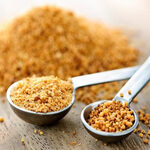 Coconut sugar, also known as coconut sap sugar, is a sugar derived from the sap of coconut tree flowers. It has been used as a traditional sweetener for centuries in regions where coconut trees flourish, such as Southeast Asia. Coconut sugar is mostly comprised of sucrose, which gives it a sweet, caramel-like flavor. Unlike refined white sugar, coconut sugar is minimally processed, and few if any chemicals are added to it, meaning that most of its minerals are left intact. For this reason, coconut sugar has become increasingly popular in the West as a substitute to white and brown sugar, and it is commonly sold in health food stores.
Coconut sugar, also known as coconut sap sugar, is a sugar derived from the sap of coconut tree flowers. It has been used as a traditional sweetener for centuries in regions where coconut trees flourish, such as Southeast Asia. Coconut sugar is mostly comprised of sucrose, which gives it a sweet, caramel-like flavor. Unlike refined white sugar, coconut sugar is minimally processed, and few if any chemicals are added to it, meaning that most of its minerals are left intact. For this reason, coconut sugar has become increasingly popular in the West as a substitute to white and brown sugar, and it is commonly sold in health food stores.
List of Health Benefits
Suitable for diabetics – One of coconut sugar’s biggest attractions as a sugar substitute is its low glycemic index score of 35, which is comparable to most fruits and vegetables. Consequently, the sugar has little impact on blood sugar levels, making it suitable for diabetics, pre-diabetics, and anyone else who wants to avoid blood sugar spikes. Most other sugar substitutes, including maple syrup and honey, have a high GI score of 69 or over, while refined sugar itself can often reach the 90s!
Rich in amino acids – Since it is unprocessed, coconut sugar contains the same 16 amino acids as the sap from which it is derived. Specifically, 100 grams of coconut sugar provide us with 34.2 milligrams of glutamic acid (an essential neurotransmitter needed for proper brain function), 11.2 milligrams of aspartic acid (promotes metabolism function, and is used to treat depression), 15.4 milligrams of threonine (maintains protein balance in the body), and 8.2 milligrams of serine (aids brain and nervous system function), as well as lower amounts of other essential and non-essential amino acids. These amino acids, being components of proteins, are needed for cell growth and repair, metabolism function, and the production of hormones and enzymes.
B vitamin complex – Coconut sap is rich in vitamins, including 12 of the essential B vitamins, and coconut sugar inherits this benefit. Of all the B vitamins, coconut sugar is highest in inositol (vitamin B8), which is needed for the formation of healthy cells and has also been used to treat anxiety and sadness. Coconut sugar is also high in thiamine, riboflavin, folic acid, choline, pyridoxal, paraaminobezoic acid, pantothenic acid, and nicotinic acid. It even contains trace amounts of vitamin B12, which is seldom found in plants. All of these B vitamins aid cellular metabolism and provide us with energy.
Excellent source of trace minerals – One teaspoon of coconut sugar contains numerous trace minerals that are not found in refined sugar. These minerals include phosphorous (important for bone growth and kidney function), potassium (reduces hypertension and lowers blood sugar levels), nitrogen (treats cardiovascular diseases), magnesium (regulates the metabolism and stimulates the brain), manganese (an important antioxidant), copper (helps release energy and aids melanin production in the skin), as well as lower amounts of zinc, iron, calcium, boron, sulfur, sodium, and chlorine.
Coconut Sugar and Palm Sugar
Although the two terms are often used interchangeably, even in Southeast Asia, coconut sugar is different to palm sugar in all areas (taste, texture, manufacturing methods, and source). Unlike coconut sugar, which is always made from coconuts, palm sugar can be made from sugar palm, date palm, sago palm, or any other “palm” product. Therefore, when purchasing coconut sugar products, always ensure that the “coconut” is clearly labeled.






